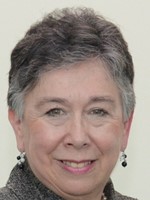

The Empowered Learner: Future Ready With Agency and Self-Advocacy Skills |
Participate and share : Interactive lecture
Kathleen McClaskey
Discover how the learning sciences can be used to empower each learner to understand the what, why and how of their learning so that they can value their variability and uniqueness and then be empowered to develop the skills to become agents and self-advocates of their own learning.
| Audience: | Curriculum/district specialists, Teachers, Technology coordinators/facilitators |
| Skill level: | Beginner |
| Attendee devices: | Devices required |
| Attendee device specification: | Smartphone: Android, iOS, Windows Laptop: Chromebook, Mac, PC Tablet: Android, iOS, Windows |
| Participant accounts, software and other materials: | Google account |
| Topic: | Personalized learning |
| Grade level: | PK-12 |
| ISTE Standards: | For Students: Empowered Learner
|
At the conclusion of this session, participants will be able to apply a 3-step process based upon the learning sciences to:
- Develop a Learner Profile to identify and discuss strengths, challenges, preferences and needs of a learner they know using the learning sciences.
- Build and decide on a Personal Learning Backpack of tools, apps, technologies, and skills to enhance a strength of support a challenge.
- Initiate a Personal Learning Plan for their learner to set a learning goal and action steps to develop the skills to enhance a strength of support a challenge so that their learner can develop agency and as well as advocate for their learning.
I. Introduction and Session Goals (5 minutes) 1. Session and personal goals for the session
II. Review the UDL Lens of Access, Engage and Express for participants to create a Learner Profile (15 minutes)
1. Create a Learner Profile of a learner they know with one strength and challenge for Access, Engage and Express. (Participants will use templates located in Google Docs)
2. Pair - Share: What did you discover about the learner that you used for the Learner Profile that you did not see before?
III. From the Learner Profile, build the Personal Learning Backpack (20 minutes)
1. Decide on one strength or challenge that the learner has and decide on tools, apps or resources that can support a challenge or enhance a strength. (Participants will be given a resource list that will include tools, apps, and links to tool/app training)
2. Pair - Share: What tools or apps did you decide on and why?
IV: Create a learning goal for the Personal Learning Plan (15 minutes)
1. Design one goal and action steps to enhance a strength of support a challenge in a Personal Learning Plan.
2. Pair - Share: What goal and actions steps did you decide on and how could this help the learner to develop agency?
V. Review and reflect on their personal goal; point to evaluations (5 minutes)
References
Bray, B., & McClaskey, K. (2017). How to Personalize Learning: A Practical Guide for Getting Started and Going Deeper. Thousand Oaks: Corwin.
Deans for Impact (2015). The science of learning. Austin, TX: Deans for Impact. Retrieved from https://deansforimpact.org/resources/the-science-of-learning/
Dweck, C. S. (2006). Mindset: The new psychology of success. New York, NY, US: Random House.
Jennings, P. A. (2012). Building an Evidence Base for Mindfulness in Educational Settings. http://www.mindful.org/mindful-voices/on-education/building-an-evidence-base-for-mindfulness-in-educational-settings
Linda Darling-Hammond, Lisa Flook, Channa Cook-Harvey, Brigid Barron & David Osher (2020) Implications for educational practice of the science of learning and development, Applied Developmental Science, 24:2, 97-140, DOI:10.1080/10888691.2018.1537791
Lopez, N., Patrick, S. and Sturgis, C., Designing for Equity: Leveraging Competency-Based Education to Ensure All Students Succeed, 2018.
Osher, D., Cantor, P., Berg, J., Steyer, L., & Rose, T. (2018). Drivers of human development: How relationships and context shape learning and development. Applied Developmental Science, 1-31. https://doi.org/10.1080/10888691.2017.1398650
Pape, B. (n.d.). Learner variability is the rule not the exception. Retrieved from https:// digitalpromise.org/wp-content/uploads/2018/06/Learner-Variability-Is-The-Rule.pdf
Pashler, H., McDaniel, M., Rohrer, D., & Bjork, R. (2008). Learning Styles: Concepts and Evidence. Psychological Science in the Public Interest, 9(3), 105-119.
Rose, T. (2013, June 19). The Myth of Average: Todd Rose at TEDxSonomaCounty. https://www.youtube.com/watch?v=4eBmyttcfU4
Science of Adolescent Learning: How Identity and Empowerment Influence Student Learning, p.13. Alliance for Excellence Education, all4ed.org
Transcend, Inc. Designing for Learning Primer, 2019.
Watkins, C. (2010). Learning, Performance and Improvement. INSI Research Matters, 34, International Network for School Improvement Web site: http://www.ioe.ac.uk/about/documents/Watkins_10_Lng_Perf_Imp_ev.pdf
Watkins, C. (2011). Learning: a sense-maker’s guide. Professional Development Series, https://www.atl.org.uk/publications-and-resources/classroom-practice-publications/learning-sense-makers-guide.asp

Boldly Go! Using Virtual Field Trips to Explore Your Curriculum
Creating Your 'Tech Sandwich'
Focus on Student Wellbeing with the Support of Book Creator